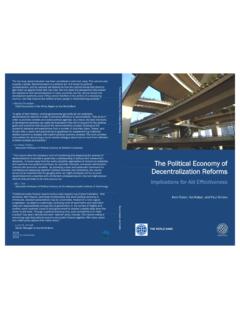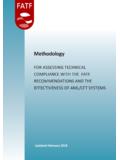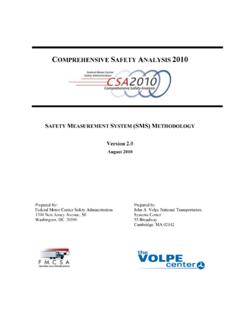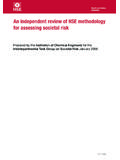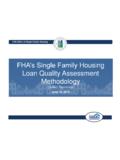Transcription of A METHODOLOGY FOR ASSESSING THE …
1 A METHODOLOGY FOR ASSESSING THE. performance OF national OIL COMPANIES. Background Paper for a Study on national Oil Companies and Value Creation Paul Stevens, THE WORLD BANK. Washington, Copyright 2008. The International Bank for Reconstruction and Development/The World Bank 1818 H Street, Washington, 20433, All rights reserved. This paper is an informal document intended to provide input for the METHODOLOGY of the Study on national Oil Companies and Value Creation, launched in March 2008 by the Oil, Gas and Mining Policy Division of the World Bank. The manuscript of this paper has not been prepared in accordance with the procedures appropriate to formally edited texts. Some sources cited in this paper may be informal documents that are not readily available. The findings, interpretations, and conclusions expressed herein are those of the author(s).
2 And do not necessarily reflect the views of the International Bank for Reconstruction and Development or the World Bank and its affiliated organizations, or those of the executive directors of the World Bank or the governments they represent. The World Bank does not guarantee the accuracy of the data included in this work. This paper may not be resold, reprinted, or redistributed for compensation of any kind without prior written permission from the World Bank. For free downloads of this paper or to make inquiries, please contact: Oil, Gas, and Mining Policy Division The World Bank 2121 Pennsylvania Avenue, NW. Washington DC, 20433. Telephone: 202-473-6990. Fax: 202-522 0395. Email: Web: Contents Acknowledgments iv About the author iv Executive summary v Creating value in oil and gas v The role of the national oil company in creating value v Factors affecting the role of national oil companies vi Measuring performance vi performance matrix vi Conclusion vii 1 Why national oil companies count 1.
3 2 Creating value in oil and gas 3. 3 The role of national oil companies in creating value 5. The national mission 5. The indirect role of the NOC as advisor and regulator 9. 4 Factors affecting the role of national oil companies 11. Exogenous factors 12. Endogenous factors 13. 5 Measuring performance 16. Aggregate impressions of performance 16. Specific measures of performance 18. Comparing performance across companies 26. 6 performance matrix 29. 7 Conclusions 38. References 39. iii Acknowledgments This paper presents the results of a study done to provide input for the METHODOLOGY to be applied in the Study on national Oil Companies (NOCs) and Value Creation, launched in March 2008 by the Oil, Gas and Mining Policy Division of The World Bank (Task Manager: Silvana Tordo). The task manager for this assignment was Silvana Tordo (Oil, Gas and Mining Division) and the paper was undertaken and written by Professor Paul Stevens (consultant).
4 The comments of peer reviewers Jonathan Walters (MNSSD), Clive Armstrong (COCSC), and Michael Levitsky (COCPO) are gratefully acknowledged. About the author Paul Stevens, , is emeritus professor at the Centre for Energy, Petroleum and Mineral Law and Policy at the University of Dundee and senior research fellow at Chatham House (Royal Institute for International Affairs) in London. iv Executive summary national oil companies (NOCs) matter because they dominate the proven oil reserves that are expected to supply the world's growing need for liquid fuels. Also, in many countries, the oil sector dominates the economy and is seen as the major source of economic development. This study seeks to help define a METHODOLOGY for ASSESSING NOCs' effectiveness, performance , and ability to create value. Creating value in oil and gas Value is created in the sector by the various links in the oil industry value chain, which starts from the resource base and moves through production, processing, transportation, and, finally, to the market.
5 While the resource base is a gift of nature, translating this into reserves and production requires investment and effort. For many NOCs, however, reserve estimates are the result of assumed arithmetic rather than any effort, and so should be discounted as a measure of performance . The production link in the value chain is related to field recovery factors and production costs, both of which have technical and managerial dimensions. The same is true of the processing and transport stages of the chain. The market value of oil both crude and petroleum products and gas can be assumed to be outside the control of NOCs in most cases around the world. The role of the national oil company in creating value NOCs directly create value since, in many cases, they are operators with control over costs and efficiency. They do so also by virtue of their national mission, which differentiates them from international oil companies (IOCs).
6 Thus, the shareholder (that is, the government) may have many different objectives, both honorable (maximizing social welfare) and not (rent seeking). This makes defining the national mission difficult and measuring its accomplishment problematic. Three dimensions can, however, be identified: (i) protecting national hydrocarbon wealth, (ii) promoting economic development, and (iii) promoting the political interests of the state abroad. Protecting hydrocarbon wealth requires maximizing the recovery factor on fields and optimizing resources, which concerns a country's depletion policy. This involves a number of choices, such as whether to produce today versus tomorrow and how to deploy current revenues. Promoting national development requires an NOC to maximize its financial and productive linkages, both forward and backward.
7 The pursuit of national political interests abroad is more difficult to define and the role of national champion more controversial. An NOC can also create value indirectly as an advisor to other elements of the government and as a regulator although this can prove problematic when the NOC is also the operator. v Factors affecting the role of national oil companies These can be divided into exogenous and endogenous factors, although sometimes the distinction is blurred. Exogenous factors relate to (i) politics, including the role of ideology, the political system, the way in which a sector is structured, and international obligations; (ii). economics the level of oil dependency, fiscal sustainability, immediate revenue needs, and overall depletion policy; and (iii) technical issues, such as the legal and competitive environment, factor input, quality, and availability.
8 Endogenous factors relate to (i) objectives commercial versus national mission issues, the role of rent seeking, and the desire to operate abroad; (ii) decision making corporate governance, the nature of the incentives system, the role of the board of directors, and the nature of the budgetary system under which the NOC operates; and (iii) capacity, including the quality of management and technicians. Measuring performance ASSESSING the relative importance of the individual factors that affect NOC performance in any scientific or objective way is impossible. But, collectively, it is possible to assess whether an NOC is performing well or not. This section considers aggregate and specific measures of performance ; of the latter, the main one is reputation, which can be assessed via the Delphi Method (as the example of NOCs in the Middle East shows).
9 Specific measures of performance concern efficiency and operational and financial measures. Such measures would be used to assess any company, IOC or NOC. But, in addition, performance measures relating to the national mission must be considered. Under each heading, various measures are defined and discussed, especially in the context of how to be quantified. The section then examines how these measures can be used to compare performance . The two bases for comparison cross-section and time series are then considered. In both cases, there are problems arising from comparing apples to oranges. Yet another problem inherent in comparing NOCs is how to aggregate the measures. Different measures have different metrics, making addition difficult. Weighting measures is also problematic. For companies listed on a stock exchange, weighting and assessment are effectively done by the market, as reflected in the share price, but for nonlisted companies this represents a major problem.
10 performance matrix A major obstacle to translating the above ideas into operational measures is lack of transparency, which characterizes many NOCs. Some NOCs are listed on stock exchanges, however, and this number is increasing under pressure to improve commercial performance and to get NOCs off state budgets. But, for many NOCs, there is a vested interest in minimizing transparency to deepen the information asymmetry at the heart of the principal-agent analysis. While there are growing vi pressures for greater transparency, its lack remains a major challenge to the accurate measurement of NOC performance . The report lists specific and quantifiable measures that can be used to assess an NOC. These are categorized as (i) general financial ratio analysis including of leverage, liquidity, profitability, and market value ratios; (ii) performance measures specific to the oil industry, both operational and financial; and (iii) national mission measures fiscal, forward, and backward linkages.




